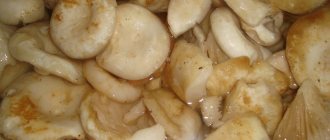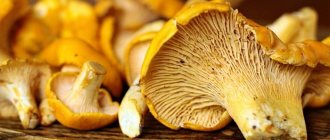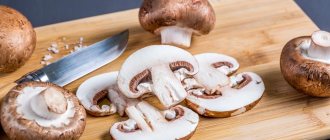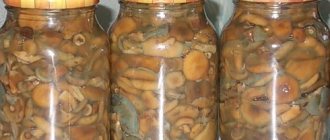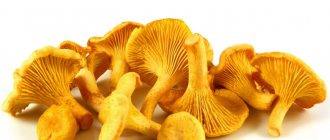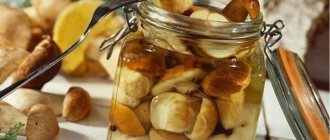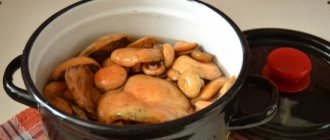Ryzhiki are considered one of the most delicious mushrooms among other species.
They can be collected in large quantities from August to October. Having found just one specimen, try bending down and lifting a tubercle from the leaf litter - you will find a whole family. Rizhiki have always been famous on holiday tables as an excellent snack. Due to their taste and beneficial properties, these fruiting bodies are suitable for preparing any dishes and preparations for the winter. Although mushrooms do not have poisonous counterparts, sometimes saffron milk caps taste bitter, why?
How to remove bitterness from mushroom soup?
The main and universal way to remove bitterness from mushrooms is to first clean them of dirt and leaves and then soak them in cold water. Let’s say that in order to remove the bitterness from milk mushrooms in this way, you need to keep them in water for two or three days. In this case, you need to change the water every day.
Interesting materials:
How much traffic do you need per month? How much should you spend on advertising on Instagram? How long should you train for weight? How long should bluelegs be cooked? How many watts of heat are needed per 1 square meter? How long should Valui be soaked? How much do you need to pay for a technical inspection? How much fat do you need on a keto diet? How many official languages are there in India? How long does it take to issue a Voivodeship invitation?
Why are saffron milk mushrooms bitter?
It is believed that the taste is influenced by the conditions where the mushrooms grew. Their caps have a porous structure that absorbs substances contained in the air, water and soil.
Important! If raw saffron milk caps are very bitter when fresh, it is better not to use them for food. The pungent taste indicates that they were collected near highways and industrial plants, where the air and soil contain toxic substances.
Mild bitterness is considered normal. Some chefs regard this flavor as a kind of zest that can highlight the unique taste of saffron milk caps. But more often when preparing, they strive to ensure that they do not taste bitter. First of all, you need to understand why this happens, since the methods for eliminating bitterness depend on the cause.
Why do saffron milk caps taste bitter after freezing?
Usually freshly picked mushrooms are frozen. They may taste bitter on their own - this is considered normal if the unpleasant aftertaste is weak.
Causes of bitterness in frozen food:
- growing in contaminated soil;
- growth in close proximity to coniferous trees;
- improper preparation for freezing.
It should also be taken into account that exposure to low temperatures also affects the structure of tissues and can affect taste. Bitterness can be caused by improper storage temperature or improper proximity to other frozen foods.
Why are salted saffron milk caps bitter?
Pickling is considered one of the best ways to preserve mushrooms for a long period of time. Situations where salted saffron milk caps taste bitter are not uncommon.
Causes of bitterness in pickled mushrooms:
- salting in aluminum, plastic, ceramic containers (freezing food in them is strictly prohibited);
- improper primary processing;
- foreign components getting into the salt;
- violation of cooking technology;
- storage in improper conditions;
- expiration date.
Another possible reason is excess salt in the marinade. Experienced cooks advise adding no more than 40-50 g of salt per 1 kg of mushrooms. Thanks to this, they will be saturated, preserved for a long time and will not deteriorate.
Why do saffron milk caps taste bitter after frying?
Fried mushrooms are always appropriate on everyday and holiday tables. Only a bitter aftertaste can spoil the impression of a dish. If fried saffron milk caps taste bitter, they may have been cooked incorrectly. In addition, the taste indicates violations during storage and processing of mushrooms.
Important! Saffron milk caps cannot be kept fresh for long. They begin to quickly deteriorate and become moldy, which also causes them to taste bitter.
Bitterness can be caused by:
- frying in low-quality oil;
- adding incompatible spices, dressings;
- temperature violation.
Proper preparation eliminates the possibility of bitterness. Therefore, you should strictly follow the recipe and add only those components to the mushrooms that go well with them.
Why are boiled saffron milk caps bitter?
Boiled mushrooms are considered a simple and very tasty snack. As a rule, they do not give a bitter taste after cooking, but there are exceptions.
The reasons are as follows:
- improper cleaning;
- poor quality of cooking water;
- adding spices;
- disruption of the cooking process.
The condition of mushrooms is adversely affected by climatic conditions. Hot, dry weather contributes to the onset of rotting in the structure of the fruiting bodies, which causes an unpleasant aftertaste. Therefore, you should figure out what to do so that the mushrooms do not become bitter after cooking.
Why are fried saffron milk caps bitter and how to rid mushrooms of bitterness?
Fried saffron milk caps are considered one of the most delicious dishes on the table. If saffron milk caps taste bitter after frying, why does this happen?
[includeme file=»wp-content/plugins/include-me/goog-right.php»]Usually the answer to the question why fried saffron milk caps are bitter is that they are not cooked properly. If the fruiting bodies were collected in coniferous forests, this speaks for itself. The fruit bodies absorb a resinous taste, which causes bitterness. Therefore, before frying saffron milk caps, they should be boiled in salted water with the addition of a pinch of citric acid. It is after heat treatment with acid and salt that the bitterness disappears.
If fried mushrooms continue to taste bitter, add sour cream to them. This dairy product completely eliminates possible bitterness from the dish.
Flour can also remove bitterness from fried mushrooms. Mushrooms are rolled in flour, dipped in beaten eggs and fried in vegetable oil until golden brown. You can add chopped parsley or dill, as well as chopped garlic, to the finished fruiting bodies.
Why is mushroom caviar or pickled saffron milk caps bitter?
Preparing caviar does not require much effort, because the saffron milk caps are simply crushed through a meat grinder or using a blender.
It happens that caviar from saffron milk caps is bitter, why? The main reason may be the use of low-quality oil that had a bitter taste. Then you should add more onions and carrots to the mushroom mass, and then simmer again. If the saffron milk caps still become bitter, then it is better to throw them away without regretting the time spent.
Why are pickled saffron milk caps bitter and how to fix it? If, after cooking, pickled mushrooms have bitterness, they need to be washed well, boiled for 5-7 minutes in clean water and again filled with freshly prepared marinade. Fruit bodies can become bitter if they are not properly pickled or if a large amount of spices and herbs are added. Therefore, after preliminary cleaning, the saffron milk caps are boiled for 20 minutes and then marinated.
RECIPES OF OUR GRANDMOTHERS Newsland – comments, discussions and news discussions.
Today I want to talk about how to prepare a very tasty and quite functional dish - mushroom caviar.
Why is it functional, because it can simply be scooped with a spoon and spread on bread, baked with meat and used as a sauce or its components. It all depends only on your imagination and the time you have.
In addition, if you suddenly have a lot of mushrooms accumulated, and the number of pickled jars, barrels of pickled mushrooms, bags of dried and frozen mushrooms in the freezer already allows you to survive a local nuclear winter, it’s time to try to create something new. Why not?
So, to prepare caviar we will need mushrooms, onions, carrots, sunflower oil, salt and ground black pepper. Everything is quite simple.
In principle, those who for some reason do not have the opportunity to pick fresh mushrooms themselves can buy them at the market or in a store, and it does not matter at all whether they are frozen or not.
The main thing is to thoroughly rinse the cooked mushrooms and throw away any spoiled or wormy ones. Since this is caviar, the variety makes absolutely no difference. The only thing I would advise is not to use mushrooms intended for pickles - saffron milk caps, milk mushrooms, trumpet mushrooms, greenfinches and russula. My caviar included boletuses, boletus, boletus, flywheels and honey mushrooms.
Fill our mushrooms with water and set them to cook. After the water boils, reduce the heat and simmer for about twenty minutes. In principle, in field conditions, caviar is made from raw mushrooms, but then they take two to three times more onions.
Speaking of onions, take three or four onions, it’s better not to skimp here, and chop them. It really doesn't matter whether you cut it small or large.
After this, grate the carrots on a coarse grater. I don’t specifically indicate how much of something to take in grams or pieces, because I always do everything with a convex naval eye. Maybe that's right. Well, in fact, everyone has their own tastes and preferences. Some will add more onions, others carrots. Why limit a person's creativity?
Mix onions and carrots in a frying pan, add sunflower oil and place on medium heat. Let it fry until golden brown. Now, our culinary ensemble looks like this:
The glibs are cooked, stir the vegetables with a wooden spatula and do not allow them to burn. Twenty minutes pass and all our components are ready
We remove the mushrooms from the pan with a slotted spoon, transfer them to a colander and rinse thoroughly, washing off foam, dirt and other production waste. We won't eat them, really.
Transfer carrots and onions to a plate. It's time for the blender to take over. According to the classics, all our ingredients need to be cranked in a meat grinder. But I haven’t used it for a long time; I gave it to someone a long time ago. A chopper is quite sufficient.
Please note that we grind the vegetables first so that the mushrooms that go on the second side are already enveloped in oil and the aroma of onions and carrots.
This is how beautiful it turns out. Let's launch mushrooms
We transfer everything received into a saucepan, put it on low-low heat, stir and begin to simmer, evaporating excess moisture and finishing the heat treatment of the product.
Here we will have to spend thirty to forty minutes. Of course, there is a temptation to turn up the heat and shorten the time. But the larger the fire, the higher the likelihood of our mixture burning. Do we need it? Stand nearby, watch TV and stir your caviar with a wooden stick. About ten minutes before removing from the heat, add salt and pepper to our mixture and stir, stir, stir.....
And at the same time we are preparing jars; we need to put the caviar somewhere.
Okay, time to turn off the gas.
The taste is simply amazing. We place the caviar tightly in the jars, leaving five to seven millimeters free, which we fill with sunflower oil. This protects the caviar from mold, drying out and air penetration.
That's basically it. There's even a little left to eat now. Bon appetit!
newsland.com
Do saffron milk caps taste bitter when salted, why does this happen and how to correct the situation?
[includeme file=»wp-content/plugins/include-me/goog-right.php»]Rizhiki have long been considered royal mushrooms, which are very tasty when salted. According to experienced mushroom pickers, these fruiting bodies are the only ones that do not need to be soaked and boiled before salting or pickling. Usually there is no bitterness in saffron milk caps, although they are considered milky.
Then a completely logical question arises: are saffron milk caps bitter when salted? Yes, if such a feature was observed in fresh fruiting bodies. So, with insufficient heat treatment, salted saffron milk caps remain bitter. But it is worth saying that for some gourmets, salting mushrooms with bitterness only adds piquancy. In their opinion, such a dish is an excellent addition to a glass of cold “forty-degree” wine.
It is worth examining one more side of the problem: why are salted saffron milk caps bitter and how to correct this situation? Salted mushrooms can be bitter for various reasons, in particular due to the addition of a large amount of spices: pepper, horseradish or dill seeds. In this case, spices that have a dominant taste over mushrooms impart this unpleasant bitterness.
If the cause of bitterness is not in spices, then the best option to get rid of it would be to boil the saffron milk caps for 15-20 minutes with the addition of salt. During cooking, a foam forms on the surface, which must be constantly skimmed off. If this is not done, then the mushrooms acquire a slight bitterness. To say with confidence that saffron milk caps will not be bitter after pickling, you can boil them first for 10 minutes, then drain the water, add new water and cook for another 10 minutes.
Why can saffron milk caps remain bitter after boiling and what should I do?
Boiled saffron milk caps have low calorie content and exquisite taste. This is a fairly simple and satisfying option for preparing fruiting bodies that does not require much expense or time.
But it happens that saffron milk caps become bitter after cooking, why can this happen? It is possible that the initial processing of the mushrooms was carried out incorrectly: cleaning from the remains of leaves, grass and dirt. If you notice that saffron milk caps are bitter, then before boiling you should soak them for 2-3 hours, changing the water regularly. This will help remove all the unpleasant bitterness from the pulp.
But why can saffron milk caps remain bitter after boiling and what can be done to fix this? It is possible that the mushrooms were collected under unfavorable weather conditions, such as extreme heat. The dry period negatively affects the taste of the product and gives it bitterness. Therefore, in this case, they need to be boiled a little longer than usual, with the addition of salt and a pinch of citric acid.
Why do frozen saffron milk caps taste bitter and how to deal with the problem?
If fresh mushrooms were frozen, then the cause of the bitterness is known: the soil in which they grew, the tarry, bitter taste, or improper primary processing.
But you can freeze boiled, fried and stewed mushrooms. Why do frozen saffron milk caps taste bitter in this case? This may have happened due to the incorrect way of storing the fruiting bodies. After all, heat-treated saffron milk caps are stored in the freezer for no more than 4-5 months. Or perhaps the product was re-frozen, which is completely unacceptable.
If frozen saffron milk caps taste bitter after thawing, they should be boiled again in salted water with the addition of citric acid. Next, prepare: fry or stew with the addition of garlic, ground black pepper and other herbs.
Now, knowing why frozen saffron milk caps taste bitter, you can successfully cope with this problem.
